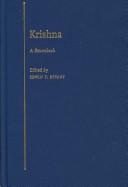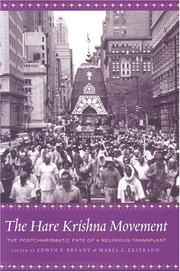| Listing 1 - 5 of 5 |
Sort by
|

ISBN: 1281158879 9786611158873 0198034008 0199724318 1435609506 9780199724314 9780198034001 9780195148916 0195148916 9780195148923 0195148924 9781281158871 9781435609501 0195148916 0195148924 Year: 2007 Publisher: New York : Oxford University Press,
Abstract | Keywords | Export | Availability | Bookmark
 Loading...
Loading...Choose an application
- Reference Manager
- EndNote
- RefWorks (Direct export to RefWorks)
Contributors: Vidyut Aklujkar, Paul Arney, Richard Barz, Neelima Shukla Bhatt, Edwin F. Bryant, Francis X. Clooney, S.J., Satyanarayana Dasa, Neal Delmonico, David Haberman, John Stratton Hawley, Alf Hiltebeitel, Steven P. Hopkins, Ekkhard Lorenz, Nancy Martin, Robert N. Minor, Bijoy M. Misra, Vasudha Narayanan, Lance E. Nelson, Graham Schweig, Deepak Sharma, Paul Sherbow, William L. Smith
Devotional literature, Indic. --- Indic devotional literature --- Indic literature --- Krishna --- Christna --- Gopal --- Kr̥ṣṇa --- Govinda --- Mohan --- Gopala --- Bal Gopal --- Krishna (Hindu deity)
Book
ISBN: 0199922748 9780199922741 9780199922758 0199922756 9780199922734 019992273X Year: 2014 Publisher: New York
Abstract | Keywords | Export | Availability | Bookmark
 Loading...
Loading...Choose an application
- Reference Manager
- EndNote
- RefWorks (Direct export to RefWorks)
Indian thought is well known for diverse philosophical and contemplative excursions into the nature of selfhood. Led by Buddhists and the yoga traditions of Hinduism and Jainism, Indian thinkers have engaged in a rigorous analysis and reconceptualization of our common notion of self. Less understood is the way in which such theories of self intersect with issues involving agency and free will; yet such intersections are profoundly important, as all major schools of Indian thought recognize that moral goodness and religious fulfillment depend on the proper understanding of personal agency. Moreover, their individual conceptions of agency and freedom are typically nodes by which an entire school's epistemological, ethical, and metaphysical perspectives come together as a systematic whole. Free Will, Agency, and Selfhood in Indian Philosophy explores the contours of this issue, from the perspectives of the major schools of Indian thought. With new essays by leading specialists in each field, this volume provides rigorous analysis of the network of issues surrounding agency and freedom as developed within Indian thought.
Free will and determinism -- Religious aspects. --- Philosophy, Indic. --- Self (Philosophy) -- India. --- Philosophy, Indic --- Self (Philosophy) --- Free will and determinism --- Philosophy & Religion --- Philosophy --- Compatibilism --- Determinism and free will --- Determinism and indeterminism --- Free agency --- Freedom and determinism --- Freedom of the will --- Indeterminism --- Liberty of the will --- Determinism (Philosophy) --- Indic philosophy --- Philosophy, East Indian --- Hindu philosophy --- Religious aspects --- Self (Philosophy) - India. --- Free will and determinism - Religious aspects. --- Religious aspects.

ISBN: 023112256X Year: 2004 Publisher: New York Columbia University Press
Abstract | Keywords | Export | Availability | Bookmark
 Loading...
Loading...Choose an application
- Reference Manager
- EndNote
- RefWorks (Direct export to RefWorks)
Krishna (Hindu deity) --- Sects --- Krishna (Divinité hindoue) --- Sectes --- Cult --- History. --- Culte --- Histoire --- International Society for Krishna Consciousness --- 294.5*97 --- 294.5*97 Hindoe-bewegingen in de 20ste eeuw: Aurobindo; Rabindranath Tagore; Ramana Maharshi; Swami Sivananda; J. Krishnamurti; Krishna conciousness --- Hindoe-bewegingen in de 20ste eeuw: Aurobindo; Rabindranath Tagore; Ramana Maharshi; Swami Sivananda; J. Krishnamurti; Krishna conciousness --- ISKCON --- International Society for Krsna Consciousness --- Internationale gemeenschap voor Krishna-bewustzijn --- the Hare Krishna movement --- 1977 --- religious history --- beliefs and practices --- religious movement --- Krishna Consciousness --- modern spiritual movement --- Hindu theology --- Krishna --- Indic monotheism --- modern Chaitanya Vaishnavism --- Gaudiya Vaishnava practice --- Mleccha Desh --- ISKCON temple worship --- Bhaktivedanta Swami --- Shri Chaitanya Mahaprabhu --- charismatice renewal --- Gaudiya Vaishnavism --- the Gaudiya Math --- Bhaktivinoda --- scriptural literalism --- Mayavadins --- gender issues --- A.C. Bhaktivedanta Swami --- post-Bhaktivedanta controversies --- devotion --- ISKCON paradigm --- Narayana Maharaja --- doctrinal controversy --- the Jiva Debate --- child abuse --- Gurukula --- Hare Krishna Mahamantra
Book

ISBN: 0824873025 082485571X 0824855698 Year: 2016 Publisher: Honolulu : University of Hawaii Press,
Abstract | Keywords | Export | Availability | Bookmark
 Loading...
Loading...Choose an application
- Reference Manager
- EndNote
- RefWorks (Direct export to RefWorks)
Meditation has flourished in different parts of the world ever since the foundations of the great civilizations were laid. It played a vital role in the formation of Asian cultures that trace much of their heritage to ancient India and China. This volume brings together for the first time studies of the major traditions of Asian meditation as well as material on scientific approaches to meditation. It delves deeply into the individual traditions while viewing each of them from a global perspective, examining both historical and generic connections between meditative practices from numerous historical periods and different parts of the Eurasian continent. It seeks to identify the cultural and historical peculiarities of Asian schools of meditation while recognizing basic features of meditative practice across cultures, thereby taking the first step toward a framework for the comparative study of meditation.The book, accessibly written by scholars from several fields, opens with chapters that discuss the definition and classification of meditation. These are followed by contributions on Yoga and Tantra, which are often subsumed under the broad label of Hinduism; Jainism and Sikhism, Indian traditions not usually associated with meditation; Buddhist approaches found in Southeast Asia, Tibet, and China; and the indigenous Chinese traditions, Daoism and Neo-Confucianism. The final chapter explores recent scientific interest in meditation, which, despite its Western orientation, remains almost exclusively concerned with practices of Asian origin.Until a few years ago a major obstacle to the study of specific meditation practices within the traditions explored here was a widespread scholarly orientation that prioritized doctrinal issues and sociocultural contexts over actual practice. The contributors seek to counter this bias and supplement concerns over doctrine and context with the historical study of meditative practice.Asian Traditions of Meditation will appeal broadly to readers interested in meditation, mindfulness, and spirituality and those in the emerging field of contemplative education, as well as students and scholars of Asian and religious studies.
Meditation. --- Philosophy. --- Sociology. --- Religion. --- Meditation. --- Asia.
Book

ISBN: 9780824855710 Year: 2016 Publisher: Honolulu
Abstract | Keywords | Export | Availability | Bookmark
 Loading...
Loading...Choose an application
- Reference Manager
- EndNote
- RefWorks (Direct export to RefWorks)
| Listing 1 - 5 of 5 |
Sort by
|

 Search
Search Feedback
Feedback About
About Help
Help News
News